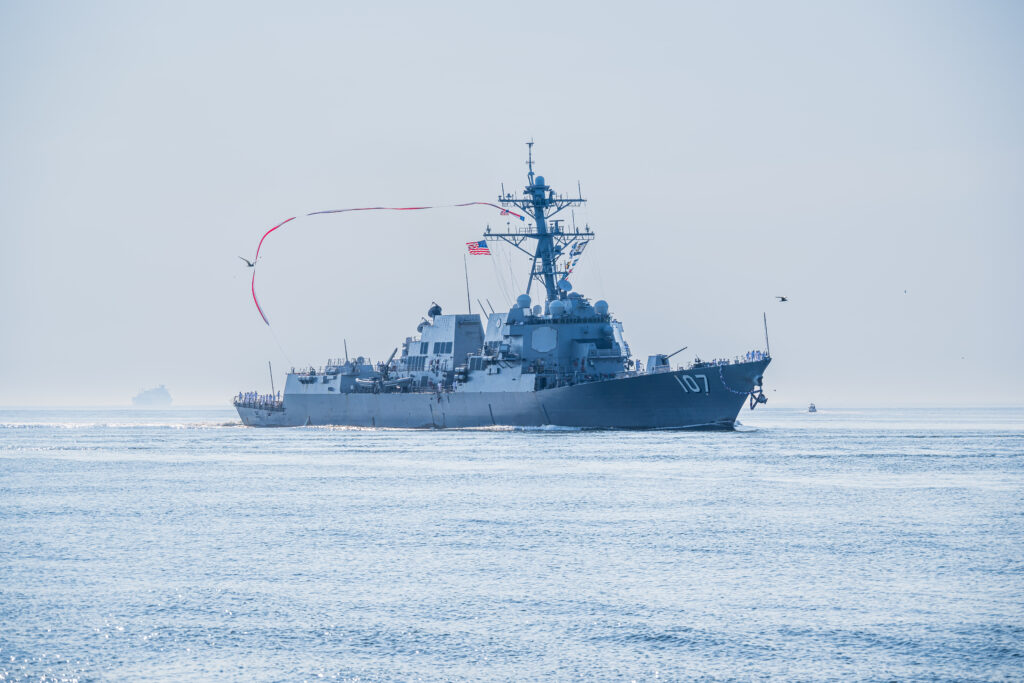Interviews / Latin American/Caribbean
14 November 2025
Postponement of the 10th Summit of the Americas Due to Be Held in the Caribbean: Symptom of a Major Geopolitical Fracture?

Initially scheduled for early December in Punta Cana, in the Dominican Republic, the 10th Summit of the Americas has been postponed to 2026. The authorities in Santo Domingo invoke both the consequences of Hurricane Melissa, which severely hit several Caribbean states, and a geopolitical context that makes “a productive dialogue complicated”, referring to rising tensions sparked by Trump 2.0’s US strategy with several Latin American governments, foremost among them Venezuela. What does this postponement reveal about the state of geopolitical fractures in the Americas? While the region faces shared challenges, how are Caribbean states moving forward in responding to the climate emergency to which they are particularly exposed? An overview with Laurent Giacobbi, Associate Research Fellow at IRIS and lecturer at the Université des Antilles.
The Summit of the Americas that was due to be held in early December in the Dominican Republic has just been postponed to 2026. The Dominican government justified this postponement by “the deep divisions that currently complicate productive dialogue in the Americas”. How should we interpret the cancellation of this summit?
The Summit of the Americas is a diplomatic forum bringing together all the heads of state and government of the American continent, from Canada to Chile. In reality, only 34 of the continent’s 35 states take part, since Cuba has been excluded for 20 years. Organised under the aegis of the Organisation of American States (OAS), this major meeting was launched in 1994 and is held on average every three or four years. The summit is intended to foster a convergence of views on major supposedly shared regional issues such as democracy, economic development, migration, security and the climate. In practice, this body, like the OAS itself, clearly serves as a diplomatic lever for the United States to advance its political priorities. This desire to steer the hemispheric agenda has already given rise to serious friction.
The most recent Summit of the Americas, held in 2022 in Los Angeles, became a sounding board for the disputes running across the American continent: the United States, as host country, refused to invite Cuba, Nicaragua and Venezuela, the three states in the hemisphere most critical of, if not outright hostile to, their big neighbour. In protest at this show of force, several leaders from the Americas announced that they would boycott the summit. It was ultimately held without the presidents of Bolivia, Guatemala, Honduras, Mexico, El Salvador, Uruguay and Saint Vincent and the Grenadines. This crisis laid bare deep disagreements over how governance is organised on the continent and marked a major diplomatic setback for Washington, whose traditional hemispheric hegemony was thus called into question. But at least that summit did take place!
The announcement of the postponement of the 10th summit raises the question of whether these diplomatic disputes have since turned into a major fracture. While the meeting was supposed to address the theme “Building a Secure and Sustainable Hemisphere with Shared Prosperity”, it is clear that visions and ambitions regarding security and development are far from shared. The deployment, in August, of a naval task group in Caribbean waters, joined in October by the aircraft carrier Gerald Ford, is a striking illustration of the return of the Big Stick. The strikes against boats allegedly transporting cocaine, which have so far left 76 people dead, are rightly seen as extrajudicial executions and have sparked a wave of protest of a kind not seen in the region for a long time.
The “reconquest”, at least in terms of influence, of the Latin American “backyard” by President Trump is meeting with unexpected resistance, which says a great deal about the lack of support for his discourse across the continent, and this well beyond the traditional opposition from Cuba or Venezuela. Multilateralism, which was already struggling to operate in the major regional fora, is now giving way to the defence of what each state considers to be its national interest, to the detriment of cooperation – which is nonetheless indispensable in addressing the numerous geostrategic challenges facing the continent. In these conditions, the decision by the Dominican Republic, one of Washington’s staunchest allies in the region, to postpone a summit that was shaping up to be a likely diplomatic fiasco becomes easier to understand.
Precisely, how can we interpret the US strategy in the region? What threat does the US deployment pose to the regional balance?
Donald Trump’s second inauguration at the White House on 20 January 2025 has profoundly altered the hemispheric geopolitical landscape and plunged South America back into practices that were thought to belong to the past. The broad thrust of US diplomacy towards Latin America remains faithful to the America First line. Trump 2.0 has taken up and intensified the three main pillars that underpinned the foreign policy of his first term: the fight against immigration and drug trafficking, maximum pressure on regimes deemed hostile (in particular Cuba and Venezuela), and the revival of the Monroe Doctrine.
It is therefore less the objectives that have changed than the methods and tone, which are far more direct and unapologetic. Driven by a fierce, indeed almost obsessive, determination to counter the growing influence of the People’s Republic of China, the US president set about reasserting control over his backyard from the outset. Panama has, in a sense, served as an example for the rest of the continent. While Trump has not taken back control of the Canal as he had proclaimed, he has nevertheless managed to secure the temporary deployment of US troops on Panamanian soil (a first since the 1999 handover) and to have the management of the ports of Balboa and Cristóbal by the group CK Hutchison Holdings Limited (Hong Kong) subjected to an audit. This company, which has very close ties to Beijing, has finally announced that it has reached an agreement in principle to sell its concession to a US consortium (made up of BlackRock, Global Infrastructure Partners and Terminal Investment Limited).
The tightening of US migration policy has also contributed to straining relations with its neighbours, particularly with some Central American countries (Guatemala, Honduras, etc.): the harsh methods used by the federal agency Immigration and Customs Enforcement, the mass return of irregular migrants to their countries of origin and the desire to externalise migration controls have all been major sources of tension with the states concerned. Added to this is the imposition of additional customs duties, sometimes accompanied by targeted diplomatic measures, as in the case of Brazil under Lula, which has been hit with tariffs of up to 50% following the imposition of a custodial sentence on former president Jair Bolsonaro.
One may therefore legitimately wonder to what extent this strategy, if indeed it can be called a strategy, is not counterproductive. This “power politics without principles” (Quessard, 2025) has generated considerable mistrust, and even outright hostility, among a number of regional actors who now appear much less inclined to follow the White House unreservedly.
The postponement of this summit is also justified by the climate disaster that has just struck several Caribbean countries, particularly Jamaica. Why is this area so vulnerable? What progress has been made at regional and international level in addressing the climate emergency in this part of the world?
Hurricane Melissa, a category 5 storm, swept through the Caribbean basin at the end of October, leaving more than fifty dead, as many missing, and very extensive material damage in its wake. Although the Dominican Republic did not lie directly in Melissa’s path, it was nevertheless severely affected by the hurricane. Major disruptions in terms of flooding, interruption of water services and structural damage are very real and justify the postponement of the Summit of the Americas.
But Melissa above all reminds us of the many vulnerabilities of this region, which is also exposed to seismic and volcanic risks. In terms of climate disruption, the Trump administration bears a clear responsibility for the region’s fragilities, in relation both to the energy transition and to prevention and emergency relief. The withdrawal from the Paris Agreement, the dismantling of the office responsible for climate diplomacy, the large-scale removal of scientific information on climate studies that had previously been published online, and the wave of lay-offs in certain US federal agencies, particularly the National Oceanic and Atmospheric Administration (NOAA), have all dealt serious blows to the fight against climate change. The absence of any US federal delegation in Belém at COP30 speaks volumes about Washington’s climate denial.
If we limit ourselves to cyclonic hazards, regional cooperation on prevention has been gravely compromised: in July 2025, one month after the start of the hurricane season, the United States announced the suspension of the sharing of satellite data used to monitor cyclonic phenomena in the Atlantic. Without this data, forecasts of how cloud masses would develop were impaired, posing a serious threat to all Caribbean populations. As for post-disaster intervention, the dismantling of USAID, the federal humanitarian aid agency, and the consequences of the shutdown have had a twofold impact: they have weakened the regional emergency management organisations that had previously received funding (such as the Caribbean Disaster Emergency Management Agency) and reduced the humanitarian assistance provided to Jamaica, which was hit head-on by Hurricane Melissa. Thus, in this area too, the multilateralism that had prevailed until then has disintegrated under the repeated blows of the Trump administration.
For more on this topic, join the online conference “Caraïbe, Venezuela : que veut Donald Trump ?“, on Wednesday 19 November from 6.30 p.m. to 8 p.m.

